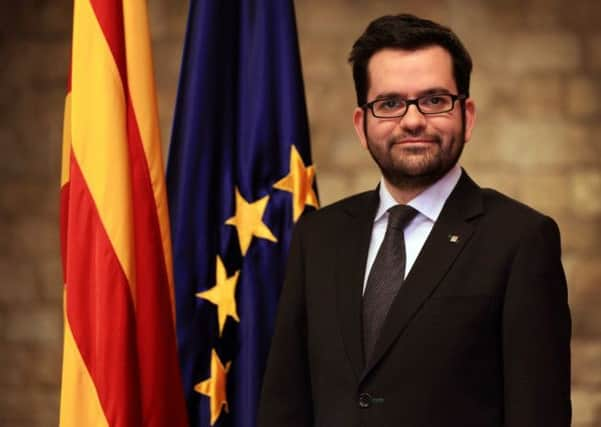We could secede from Spain, warns Catalan minister


Speaking to the Scotsman ahead of giving evidence in Holyrood on Thursday, the Catalan minister for external affairs Roger Albiniyana said a move, which could throw Europe into chaos, was a possibility if elections this year return a pro-independence majority in the Catalan assembly in September and the Spanish government continues to refuse to negotiate with the region.
FOLLOW US
SCOTSMAN TABLET AND MOBILE APPS
He also suggested that had Spain followed the same path of devolution with Catalonia as the UK has with Scotland instead of a “recentralising” agenda then calls for independence in his region would not be as strong.
Advertisement
Hide AdAdvertisement
Hide AdLast November a non-binding referendum in Catalonia, which was not recognised by Madrid, saw 80 per cent support for independence but the result was undermined by a turnout of less than 40 per cent.
The result means that the Catalan regional elections have been called this year for 27 September with pro-independence parties preparing to share a platform in the same way parties came together under the Yes Scotland and Better Together banners in the Scottish referendum.
Mr Albiniyana described the election as Catalonia’s “referendum”.
He said: “The expectations of the [Catalan] government that those parties defending independence will gain an absolute majority which will give a clear mandate to the next government to negotiate independence from Spain.”
He also expected a “large number” of pro-independence Catalan MPs to be returned in the Spanish national election in November.
He said he hoped the results would bring the Spanish government to the negotiating table to hold talks.
He warned that negotiating was “the only acceptable outcome for Spain” and said a failure to do so “would be sending a very negative message to the world
And he was clear that a unilateral declaration of independence is an option.
Advertisement
Hide AdAdvertisement
Hide AdHe said: “As a government we do not disregard any possible means in order to fulfil the commitment and the mandate given to us by Catalan citizens.
“But of course we would like this process to be conducted in the most negotiated way. Therefore the idea is not to declare independence until all possible ways of negotiation have been explored.”
He was also clear that Catalonia’s case was very different to that of Scotland last year.
He said: “There is a very important comparison and this is the fact that Scottish people could actually vote in a democratic agreed referendum on 18 September. While the Catalan government has been attempting for the last two years and a half to get exactly the same kind of format with regards to the Spanish government and the Spanish government has not reacted in the same democratic way as the UK government did when the UK Prime Minister decided to agree with the Scottish First Minister the terms of that referendum.”
As a result of this he said the push for Catalan independence was “a bottom process” driven by large scale demonstrations of more than a million people.
But he added: “In Scotland it has been more a top down approach of the leadership in the government which has validated these ideas with the Scottish people.”
He said that if Catalonia had received the same level of devolution as Scotland it was “most likely” many would give up on independence.
However, he noted: “The problem is that one must understand what is the scenario is likely to happen or not in Spain. What we have seen in the last five years is the trend is completely opposite. While UK Government is ready to compromise more with devolution in Spain the government in Madrid is currently recentralising the country.”
Advertisement
Hide AdAdvertisement
Hide AdHe highlighted how the Constitutional Court in Spain in 2010 blocked an agreement to make Catalonia autonomous even though it was passed with majorities in the Spanish and Catalan parliaments in 2006.
He said the main driver for independence is “the perception that Catalan people have that Spain doesn’t want to understand or accept Catalan people as they are.”
He went on: “Many Catalans believe that Catalonia is a nation but Madrid does not accept this.
“This problem in the UK doesn’t exist because the Prime Minister, Deputy Prime Minister and leader of the Opposition in Westminster accept that the UK is a nation of nations whereas in Spain this concept has never been accepted.”
Mr Albiniyana will be giving evidence to Holyrood’s external affairs committee on how a sub-national government can conduct foreign affairs.
He said that he will tell MSPs they need to “outline their objectives” including promoting the culture and economy as well as building relations with states and international organisations.
However, he will also tell the committee that part of his role is to prepare the international community for the prospect of Catalan independence to prevent any alarm over a major upheaval.
He said: “There are certain messages which we have to be produced to convey to state actors, multilateral organisations, international partners and economic stakeholders that have the purpose of softening the economic effect of the process that is happening in Catalonia.
Advertisement
Hide AdAdvertisement
Hide Ad“International actors abroad want to secure continuity of the international environment.
“When you look at what might happen in an independent Catalonia in foreign policy, in energy policy, in defence policy, what we try to convey is like ideas so that all these actors can figure out how an independent Catalonia would look like.”